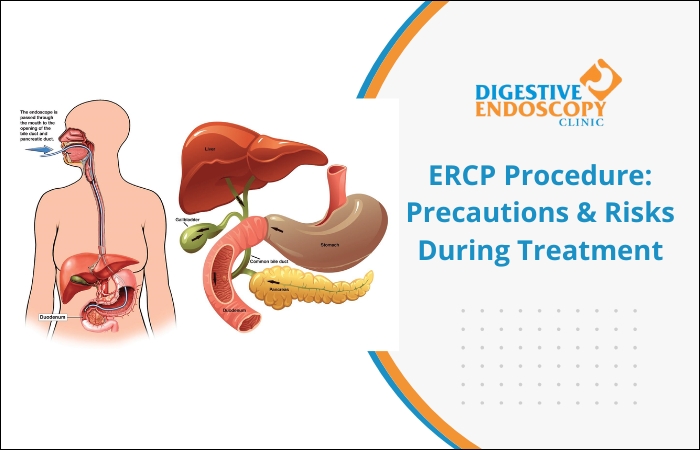
ERCP Procedure: Precautions & Risks During Treatment
If you or a loved one has been recommended an ERCP, you likely have questions about what it entails. ERCP, or Endoscopic Retrograde Cholangio-Pancreatography, is a specialized procedure used to diagnose and treat problems in the liver, gallbladder, bile ducts, and pancreas. While it is a minimally invasive alternative to surgery, understanding the necessary precautions and potential risks is crucial for a safe and successful outcome.
At Digestive Endoscopy Clinic in Pune, under the care of Dr. Suresh Jain, we believe an informed patient is an empowered patient. This guide will walk you through the key precautions to take and the risks to be aware of during your ERCP treatment.
What is an ERCP?
Before we discuss precautions, let’s briefly understand the procedure. An ERCP combines upper gastrointestinal (GI) endoscopy and X-rays to find and treat issues in the bile and pancreatic ducts. A thin, flexible tube (endoscope) is passed through your mouth, down your esophagus, and into your stomach and duodenum. From there, a small catheter is inserted to inject a contrast dye into the ducts, making them visible on X-ray. Dr. Suresh Jain can then use tiny instruments to perform treatments like removing gallstones, placing stents, or taking tissue samples.
Essential Precautions Before and After ERCP
Taking the right steps before and after the procedure significantly minimizes risks and aids recovery.
Before the Procedure:
-
Comprehensive Consultation: The most critical step is a detailed discussion with your gastroenterologist, Dr. Suresh Jain. Disclose your complete medical history, including all allergies (especially to iodine or contrast dye), current medications (blood thinners, diabetes drugs, etc.), and if there is any chance you could be pregnant.
-
Fasting: You will be instructed to fast (no food or water) for approximately 6-8 hours before the ERCP. This is essential to ensure your stomach is empty, reducing the risk of aspiration during the procedure.
-
Medication Management: You may be asked to temporarily stop certain medications, particularly blood thinners like aspirin, clopidogrel, or warfarin. Never stop any medication without your doctor’s explicit instructions.
-
Arrange for Support: As you will receive sedation, you will not be able to drive, operate machinery, or make important decisions for the next 24 hours. Arrange for a friend or family member to drive you home and stay with you.
After the Procedure:
-
Recovery Monitoring: You will be monitored in a recovery area until the sedation wears off. It’s normal to experience a sore throat or bloating.
-
Gradual Reintroduction to Food: You will start with clear liquids and gradually progress to a soft diet as tolerated.
-
Watch for Warning Signs: While complications are uncommon, it’s vital to know the signs. Contact your doctor immediately if you experience severe abdominal pain, fever, chills, difficulty swallowing, chest pain, or black, tarry stools.
Understanding the Risks of ERCP
ERCP is a complex and highly effective procedure, but like any medical intervention, it carries some risks. Dr. Suresh Jain and his team are trained to manage these, but patient awareness is key.
The most common risk is Pancreatitis – an inflammation of the pancreas. This occurs in a small percentage of patients and typically causes abdominal pain after the procedure. It is usually mild and resolves with conservative treatment in a few days.
Other less common risks include:
- Bleeding: This can occur if a small incision (sphincterotomy) is made in the muscle to access a duct. It’s usually minor and can be controlled during the procedure.
- Infection (Cholangitis): An infection of the bile ducts can occur if drainage is incomplete.
- Perforation: A rare but serious risk where a small tear occurs in the lining of the intestine or duct.
- Reaction to Sedation: Some patients may have adverse reactions to the sedatives used.
Dr. Suresh Jain and his expert team at Digestive Endoscopy Clinic employ the latest techniques and technology to keep these risks to an absolute minimum. The benefits of treating a blocked bile duct or removing a painful gallstone almost always far outweigh the potential risks.
Expert ERCP Care in Pune
If you have been advised to undergo an ERCP, choosing an experienced gastroenterologist is the most important decision you can make. At Digestive Endoscopy Clinic, Dr. Suresh Jain, a leading gastroenterologist in Pune, brings years of specialized expertise in performing ERCP with the highest standards of safety and patient care.
Don’t let digestive issues hold you back. Schedule a consultation with Dr. Suresh Jain today to discuss your treatment options in a supportive and expert environment.
Frequently Asked Questions (FAQs)
1. How long does an ERCP procedure take?
The procedure itself typically takes between 30 minutes to 2 hours, depending on the complexity of the treatment required.
2. Is ERCP a major surgery?
No, ERCP is not considered major surgery. It is a minimally invasive endoscopic procedure that does not require external incisions.
3. What is the most common complication after ERCP?
The most frequent complication is post-ERCP pancreatitis, which is an inflammation of the pancreas. Your medical team will monitor you closely for this.
4. What is the recovery time after an ERCP?
Most patients can resume normal activities within a day or two. However, if a more complex treatment was performed, your doctor may advise a longer recovery period.
5. How painful is an ERCP?
The procedure is performed under sedation, so you should not feel any pain. Afterward, a sore throat and some abdominal discomfort or bloating are common but manageable.
